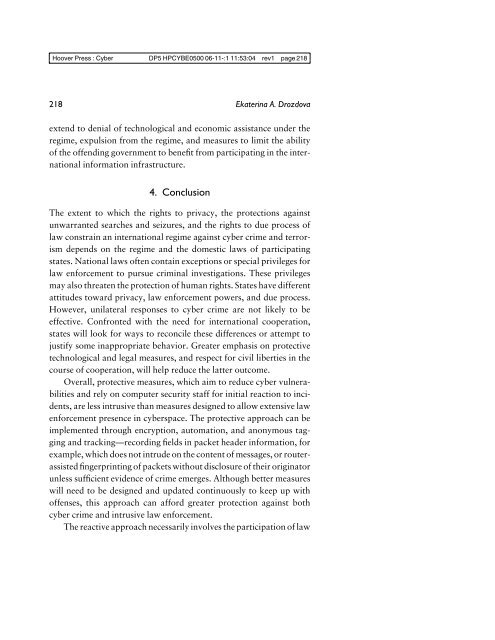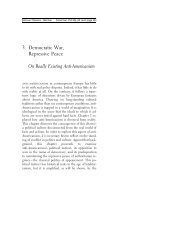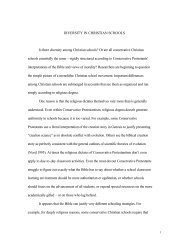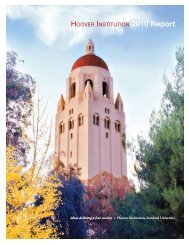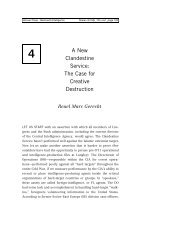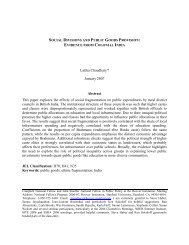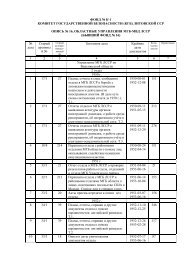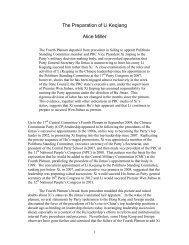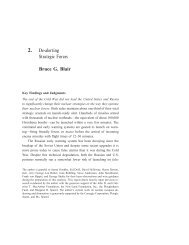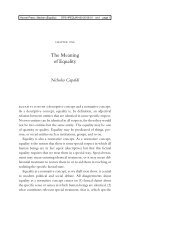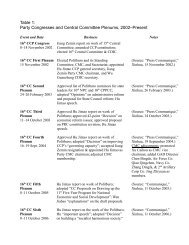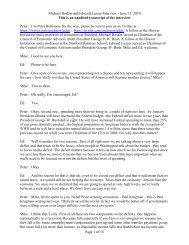Civil Liberties and Security in Cyberspace - Hoover Institution
Civil Liberties and Security in Cyberspace - Hoover Institution
Civil Liberties and Security in Cyberspace - Hoover Institution
Create successful ePaper yourself
Turn your PDF publications into a flip-book with our unique Google optimized e-Paper software.
<strong>Hoover</strong> Press : Cyber DP5 HPCYBE0500 06-11-:1 11:53:04 rev1 page 218<br />
218 Ekater<strong>in</strong>a A. Drozdova<br />
extend to denial of technological <strong>and</strong> economic assistance under the<br />
regime, expulsion from the regime, <strong>and</strong> measures to limit the ability<br />
of the offend<strong>in</strong>g government to benefit from participat<strong>in</strong>g <strong>in</strong> the <strong>in</strong>ternational<br />
<strong>in</strong>formation <strong>in</strong>frastructure.<br />
4. Conclusion<br />
The extent to which the rights to privacy, the protections aga<strong>in</strong>st<br />
unwarranted searches <strong>and</strong> seizures, <strong>and</strong> the rights to due process of<br />
law constra<strong>in</strong> an <strong>in</strong>ternational regime aga<strong>in</strong>st cyber crime <strong>and</strong> terrorism<br />
depends on the regime <strong>and</strong> the domestic laws of participat<strong>in</strong>g<br />
states. National laws often conta<strong>in</strong> exceptions or special privileges for<br />
law enforcement to pursue crim<strong>in</strong>al <strong>in</strong>vestigations. These privileges<br />
may also threaten the protection of human rights. States have different<br />
attitudes toward privacy, law enforcement powers, <strong>and</strong> due process.<br />
However, unilateral responses to cyber crime are not likely to be<br />
effective. Confronted with the need for <strong>in</strong>ternational cooperation,<br />
states will look for ways to reconcile these differences or attempt to<br />
justify some <strong>in</strong>appropriate behavior. Greater emphasis on protective<br />
technological <strong>and</strong> legal measures, <strong>and</strong> respect for civil liberties <strong>in</strong> the<br />
course of cooperation, will help reduce the latter outcome.<br />
Overall, protective measures, which aim to reduce cyber vulnerabilities<br />
<strong>and</strong> rely on computer security staff for <strong>in</strong>itial reaction to <strong>in</strong>cidents,<br />
are less <strong>in</strong>trusive than measures designed to allow extensive law<br />
enforcement presence <strong>in</strong> cyberspace. The protective approach can be<br />
implemented through encryption, automation, <strong>and</strong> anonymous tagg<strong>in</strong>g<br />
<strong>and</strong> track<strong>in</strong>g—record<strong>in</strong>g fields <strong>in</strong> packet header <strong>in</strong>formation, for<br />
example, which does not <strong>in</strong>trude on the content of messages, or routerassisted<br />
f<strong>in</strong>gerpr<strong>in</strong>t<strong>in</strong>g of packets without disclosure of their orig<strong>in</strong>ator<br />
unless sufficient evidence of crime emerges. Although better measures<br />
will need to be designed <strong>and</strong> updated cont<strong>in</strong>uously to keep up with<br />
offenses, this approach can afford greater protection aga<strong>in</strong>st both<br />
cyber crime <strong>and</strong> <strong>in</strong>trusive law enforcement.<br />
The reactive approach necessarily <strong>in</strong>volves the participation of law


